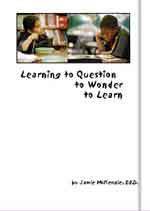Feeling Lucky?
Surrendering
to Pundits, Wizards and Mindbots
by Jamie McKenzie, © 2006, all rights reserved.
About the author
Gathering good intelligence is critically important for all of us and schools must equip students to do it for themselves rather than relying upon seductive but unreliable pundits, wizards and mindbots.
What's wrong with Mindbots?
A mindbot is a program that does your thinking or searching for you in an automated manner, relying upon artificial intelligence of some kind to search out truth. It is something like "Searching for Dummies" or "Thinking for Dummies."
As an example, Google offers an intriguing search option.
When you arrive at the basic Google page, you will see the option "I'm feeling lucky" below the search box.
Select this option, type in the word "truth" and see what happens.
Google takes you to http://thetruth.com.
Wouldn't it be nice if finding the truth were so simple?
What do they mean by "I'm feeling lucky?"
It seems they want us to surrender to their judgment as to which Web site best serves the question asked. "I'm feeling lazy," is a more accurate wording for such surrender. How reliable is their judgment? Judge for yourself.
On a Good Day
"I'm feeling lucky" can save you lots of time, sending you to premium information.
Want to know about "questioning?" "Feeling lucky?" sends you to my Web site, http://questioning.org, an act of amazing wisdom. Such discernment.
Want to know about taxes? "Feeling lucky?" sends you to the IRS in the USA. I wonder if it knows to send you to Inland Revenue if you live in New Zealand?
Want to know about fascism? "Feeling lucky?" sends you to Wikipedia, a questionable choice of expertise.
Want to know about United Airlines? "Feeling lucky?" sends you to http://www.united.com/, Spot on!
Want to know about the future? "Feeling lucky?" sends you to the World Future Society. Spot on again!
On Other Days
Google can lead you astray, send you to biased sites or waste your time.
Want to know about No Child Left Behind? "Feeling lucky?" sends you to the Ed department's propaganda site at http://www.ed.gov/nclb/landing.jhtml.
Want to know about beauty? "Feeling lucky?" sends you to beauty tips at http://beauty.ivillage.com/.
Want to know about greed? "Feeling lucky?" sends you to http://www.g-r-e-e-d.com/GREED.htm, which is spot on but pretty hard edged.
Want to know about finding happiness? "Feeling lucky?" sends you to a 1998 movie http://www.imdb.com/title/tt0147612/
Want to know about true love? "Feeling lucky?" sends you to http://www.christiananswers.net/q-dml/dml-y030.html
Want to know about President Bush? "Feeling lucky?" sends you to http://www.whitehouse.gov/. Nothing but unvarnished truth there.
Want to know about the War in Iraq? "Feeling lucky?" sends you to http://www.cnn.com/SPECIALS/2003/iraq/ "This page was archived in May 2003 when President Bush declared an end to major combat. However, the coalition casualties list continues to be updated."
Want to know about the Civil War in Iraq? "Feeling lucky?" sends you to http://www.antiwar.com/lind/?articleid=3120 Pretty hard edged.
Want to know about the true grit? "Feeling lucky?" sends you to the movie at http://www.imdb.com/title/tt0065126/
What's Wrong with Wizards?
There are many times when a wizard (software) is a godsend. They can make a complex task so much simpler, leading us step by step by the hand so that we get it right from the outset.
But not all wizards (software and human) are so benign. When the wizard steers us in subtle but manipulative ways undisclosed to the user, we are crossing into dangerous territory. Similarly, if the wizard restricts us to trite or formulaic products or expressions, the wizard is a regrettable compromise. This issue was covered previously in some depth in the article, "Template Art, Template Thinking, MultiMediocracy and Other TomFoolery" FNO April 1999 at http://fno.org/apr99/clipart.html.
What's Wrong with Pundits?
Most of us have favorite commentators and thinkers whose columns we love to read because they make us chuckle and their thinking often resonates with our own. The danger comes when we isolate ourselves and read or watch only those thinkers whose beliefs and politics match our own. We can stop thinking for ourselves and surrender to their sagacity.
This reliance upon sympathetic sources is actually a form of isolation, blindness and poverty, as Christine Rosen suggests in her article "The Age of Egocasting" in The New Atlantis at http://www.thenewatlantis.com/archive/7/rosen.htm.
She quotes University of Chicago law professor Cass Sunstein:
- "As the customization of our communications universe increases, society is in danger of fragmenting, shared communities in danger of dissolving."
-
- Borrowing the idea of “the daily me” from M.I.T. technologist Nicholas Negroponte, Sunstein describes a world where “you need not come across topics and views that you have not sought out. Without any difficulty, you are able to see exactly what you want to see, no more and no less."
If we surround ourselves with only the likes of Maureen Dowd, Frank Rich and Paul Krugman on the one hand or Pat Buchanan, Robert Novak, William F. Buckley, Jr., George Will and William Safire on the other hand, we limit our view and our understanding considerably, just as we do when we read only Americans in America or only Australians in Australia. Narrow mindedness is the danger, whether it be caused by reading only those who echo our thoughts or only those who live in the same neighborhoods.
|
